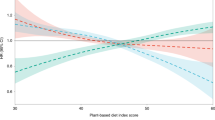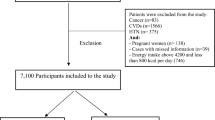Abstract
Background and aims
Plant-based diets have been suggested to have beneficial effects on various health outcomes. However, the evidence on the association of plant-based diet quality with health outcomes is very limited in Asian populations, who may have a different dietary pattern than western populations. This study explored the prospective association between different types of plant-based diets and risk of hypertension using recently established indices in South Koreans.
Methods
Analyses were based on a community-based cohort of 5636 men and women (40–69 years of age at baseline, mean ± SD 50.6 ± 8.5 years) living in Ansan and Ansung, South Korea (2001–2016) without hypertension and related chronic diseases at baseline. Registration card and telephone registration number were used for the sampling. Dietary intakes were assessed using a validated food frequency questionnaire. Based on the questionnaire, scores of three plant-based diet indices [overall plant-based diet index (PDI), healthful plant-based diet index (hPDI), and unhealthful plant-based diet index (uPDI)] were calculated.
Results
Over a follow-up of 14 years, 2244 participants developed hypertension. Individuals in the highest vs. lowest quintile of hPDI had 35% lower incidence of hypertension [hazard ratio (HR) 0.65, 95% CI 0.57, 0.75] and uPDI had 44% higher incidence of hypertension (HR 1.44, 95% CI 1.24, 1.67), adjusting for demographic characteristics, and lifestyle factors (P trend ≤ 0.0001 for both indices). A similar inverse association of hPDI was observed with risk of hypertension by age, sex, residence area, and obesity. The PDI was not associated with hypertension.
Conclusions
Our results highlight the importance of considering the quality of plant foods (relatively higher healthy plant foods and relatively lower less healthy plant foods consumption) for the prevention of hypertension in a population with a long-term adherence to predominantly plant-based diets.



Similar content being viewed by others
Abbreviations
- BMI:
-
Body mass index
- CVD:
-
Cardiovascular disease
- DBP:
-
Diastolic blood pressure
- FFQ:
-
Food frequency questionnaire
- hPDI:
-
Healthful plant-based diet index
- HR:
-
Hazard ratio
- KoGES:
-
Korean Genome and Epidemiology Study
- MET:
-
Metabolic equivalent of task
- PDI:
-
Overall plant-based diet index
- SBP:
-
Systolic blood pressure
- SD:
-
Standard deviation
- uPDI:
-
Unhealthful plant-based diet index
References
Lewington S, Clarke R, Qizilbash N, Peto R, Collins R, Prospective Studies C (2002) Age-specific relevance of usual blood pressure to vascular mortality: a meta-analysis of individual data for one million adults in 61 prospective studies. Lancet 360(9349):1903–1913
G. B. D. Risk Factors Collaborators (2016) Global, regional, and national comparative risk assessment of 79 behavioural, environmental and occupational, and metabolic risks or clusters of risks, 1990–2015: a systematic analysis for the global burden of disease study 2015. Lancet 388(10053):1659–1724
Yokoyama Y, Nishimura K, Barnard ND, Takegami M, Watanabe M, Sekikawa A, Okamura T, Miyamoto Y (2014) Vegetarian diets and blood pressure: a meta-analysis. JAMA Intern Med 174(4):577–587
Kim H, Caulfield LE, Garcia-Larsen V, Steffen LM, Grams ME, Coresh J, Rebholz CM (2019) Plant-based diets and incident CKD and kidney function. Clin J Am Soc Nephrol 14(5):682–691
Satija A, Bhupathiraju SN, Rimm EB, Spiegelman D, Chiuve SE, Borgi L, Willett WC, Manson JE, Sun Q, Hu FB (2016) Plant-based dietary patterns and incidence of type 2 diabetes in US men and women: results from three prospective cohort studies. PLoS Med 13(6):e1002039
Satija A, Bhupathiraju SN, Spiegelman D, Chiuve SE, Manson JE, Willett W, Rexrode KM, Rimm EB, Hu FB (2017) Healthful and unhealthful plant-based diets and the risk of coronary heart disease in U.S. adults. J Am Coll Cardiol 70(4):411–422
Swaminathan S, Dehghan M, Raj JM, Thomas T, Rangarajan S, Jenkins D, Mony P, Mohan V, Lear SA, Avezum A (2021) Associations of cereal grains intake with cardiovascular disease and mortality across 21 countries in prospective urban and rural epidemiology study: prospective cohort study. BMJ 372:m4948
Halton TL, Willett WC, Liu S, Manson JE, Stampfer MJ, Hu FB (2006) Potato and french fry consumption and risk of type 2 diabetes in women. Am J Clin Nutr 83(2):284–290
Ardeshirlarijani E, Jalilpiran Y, Daneshzad E, Larijani B, Namazi N, Azadbakht L (2021) Association between sugar-sweetened beverages and waist circumference in adult populations: a meta-analysis of prospective cohort studies. Clin Nutr ESPEN 41:118–125
Baden MY, Liu G, Satija A, Li Y, Sun Q, Fung TT, Rimm EB, Willett WC, Hu FB, Bhupathiraju SN (2019) Changes in plant-based diet quality and total and cause-specific mortality. Circulation 140(12):979–991
Satija A, Malik V, Rimm EB, Sacks F, Willett W, Hu FB (2019) Changes in intake of plant-based diets and weight change: results from 3 prospective cohort studies. Am J Clin Nutr 110(3):574–582
Park SY, Murphy SP, Wilkens LR, Yamamoto JF, Sharma S, Hankin JH, Henderson BE, Kolonel LN (2005) Dietary patterns using the Food Guide Pyramid groups are associated with sociodemographic and lifestyle factors: the multiethnic cohort study. J Nutr 135(4):843–849
Micha R, Khatibzadeh S, Shi P, Andrews KG, Engell RE, Mozaffarian D, Global Burden of Diseases N, Chronic Diseases Expert G (2015) Global, regional and national consumption of major food groups in 1990 and 2010: a systematic analysis including 266 country-specific nutrition surveys worldwide. BMJ Open 5(9):e008705
Kim EK, Ha AW, Choi EO, Ju SY (2016) Analysis of Kimchi, vegetable and fruit consumption trends among Korean adults: data from the Korea national health and nutrition examination survey (1998–2012). Nutr Res Pract 10(2):188–197
Kim J, Kim J (2018) Association between fruit and vegetable consumption and risk of hypertension in middle-aged and older Korean adults. J Acad Nutr Diet 118(8):1438–1449 (e1435)
WHO Expert Consultation (2004) Appropriate body-mass index for Asian populations and its implications for policy and intervention strategies. Lancet (London, England) 363(9403):157–163
Kim H, Lee K, Rebholz CM, Kim J (2020) Plant-based diets and incident metabolic syndrome: results from a South Korean prospective cohort study. PLoS Med 17(11):e1003371
Lee H-S, Kim Y, Park T (2018) New common and rare variants influencing metabolic syndrome and its individual components in a Korean population. Sci Rep 8(1):1–7
Kim Y, Han BG, KoGES group (2017) Cohort profile: the Korean genome and epidemiology study (KoGES) consortium. Int J Epidemiol 46(2):e20
Kim H, Rebholz CM, Garcia-Larsen V, Steffen LM, Coresh J, Caulfield LE (2020) Operational differences in plant-based diet indices affect the ability to detect associations with incident hypertension in middle-aged US adults. J Nutr 150(4):842–850
Ahn Y, Kwon E, Shim JE, Park MK, Joo Y, Kimm K, Park C, Kim DH (2007) Validation and reproducibility of food frequency questionnaire for Korean genome epidemiologic study. Eur J Clin Nutr 61(12):1435–1441
Lim M, Kim J (2020) Association between fruit and vegetable consumption and risk of metabolic syndrome determined using the Korean genome and epidemiology study (KoGES). Eur J Nutr 59(4):1667–1678
The Korean Nutrition Society (2000) Food composition table. Recommended dietary allowances for Koreans, 7th edn. The Joogangcopy, Seoul
Lee K, Giovannucci EL, Kim J (2020) The effect of smoking and sex on the association between long-term alcohol consumption and metabolic syndrome in middle-aged and older population. J Epidemiol 31(4):249–258
Ainsworth BE, Haskell WL, Whitt MC, Irwin ML, Swartz AM, Strath SJ, O’Brien WL, Bassett DR Jr, Schmitz KH, Emplaincourt PO, Jacobs DR Jr, Leon AS (2000) Compendium of physical activities: an update of activity codes and MET intensities. Med Sci Sports Exerc 32(9 Suppl):S498-504
Schoenfeld D (1982) Partial residuals for the proportional hazards regression model. Biometrika 69(1):239–241
Daniel CR, Cross AJ, Koebnick C, Sinha R (2011) Trends in meat consumption in the USA. Public Health Nutr 14(4):575–583
Sukhato K, Akksilp K, Dellow A, Vathesatogkit P, Anothaisintawee T (2020) Efficacy of different dietary patterns on lowering of blood pressure level: an umbrella review. Am J Clin Nutr 112(6):1584–1598
Streppel MT, Arends LR, van ‘t Veer P, Grobbee DE, Geleijnse JM (2005) Dietary fiber and blood pressure: a meta-analysis of randomized placebo-controlled trials. Arch Intern Med 165(2):150–156
Filippini T, Violi F, D’Amico R, Vinceti M (2017) The effect of potassium supplementation on blood pressure in hypertensive subjects: a systematic review and meta-analysis. Int J Cardiol 230:127–135
Alexander S, Ostfeld RJ, Allen K, Williams KA (2017) A plant-based diet and hypertension. J Geriatr Cardiol 14(5):327–330
Suter PM, Sierro C, Vetter W (2002) Nutritional factors in the control of blood pressure and hypertension. Nutr Clin Care 5(1):9–19
Watzl B (2008) Anti-inflammatory effects of plant-based foods and of their constituents. Int J Vitam Nutr Res 78(6):293–298
Dinh QN, Drummond GR, Sobey CG, Chrissobolis S (2014) Roles of inflammation, oxidative stress, and vascular dysfunction in hypertension. Biomed Res Int 2014:406960
Chen Q, Turban S, Miller ER, Appel LJ (2012) The effects of dietary patterns on plasma renin activity: results from the dietary approaches to stop hypertension trial. J Hum Hypertens 26(11):664–669
Landsberg L (1999) Insulin resistance and hypertension. Clin Exp Hypertens 21(5–6):885–894
Chuang SY, Chiu TH, Lee CY, Liu TT, Tsao CK, Hsiung CA, Chiu YF (2016) Vegetarian diet reduces the risk of hypertension independent of abdominal obesity and inflammation: a prospective study. J Hypertens 34(11):2164–2171
Marques FZ, Nelson E, Chu PY, Horlock D, Fiedler A, Ziemann M, Tan JK, Kuruppu S, Rajapakse NW, El-Osta A, Mackay CR, Kaye DM (2017) High-fiber diet and acetate supplementation change the gut microbiota and prevent the development of hypertension and heart failure in hypertensive mice. Circulation 135(10):964–977
Kim J, Kim J, Kang Y (2019) Noodle consumption is positively associated with incident hypertension in middle-aged and older Korean women. Nutr Res Pract 13(2):141–149
Radhika G, Van Dam RM, Sudha V, Ganesan A, Mohan V (2009) Refined grain consumption and the metabolic syndrome in urban Asian Indians (Chennai urban rural epidemiology study 57). Metabolism 58(5):675–681
Kang Y, Kim J (2016) Association between fried food consumption and hypertension in Korean adults. Br J Nutr 115(1):87–94
Kang Y, Lee K, Lee J, Kim J (2020) Grain subtype and the combination of grains consumed are associated with the risk of metabolic syndrome: analysis of a community-based prospective cohort. J Nutr 150(1):118–127
Pechere-Bertschi A, Burnier M (2004) Female sex hormones, salt, and blood pressure regulation. Am J Hypertens 17(10):994–1001
Balan H, Popescu L (2014) “Gender specific medicine”: a focus on gender-differences in hypertension. Rom J Intern Med 52(3):129–141
Abramson BL, Melvin RG (2014) Cardiovascular risk in women: focus on hypertension. Can J Cardiol 30(5):553–559
Khalil RA (2005) Sex hormones as potential modulators of vascular function in hypertension. Hypertension 46(2):249–254
Nickenig G (2004) Should angiotensin II receptor blockers and statins be combined? Circulation 110(8):1013–1020
Acknowledgements
Data used in this study were obtained from the Korean Genome and Epidemiology Study (KoGES; 4851-302), National Research Institute of Health, Centers for Disease Control and Prevention, Ministry for Health and Welfare, Republic of Korea. We would like to thank the study participants and staff.
Funding
This work was supported by the National Research Foundation of Korea (NRF) grant funded by the Korea government(Ministry of Science and ICT) (No. 2021R1A2C1003211, to JK). The funders had no role in study design, data collection and analysis, decision to publish, or preparation of the manuscript.
Author information
Authors and Affiliations
Contributions
JK designed the study, analyzed the data and wrote first draft of the manuscript. HK was involved in research methodology and revising manuscript. EG was involved in designing study and revising the manuscript. All authors critically reviewed and approved the final manuscript. None of the authors declare a financial or personal conflict of interest related to this work. The corresponding author had full access to all the data in the study and had final responsibility for the decision to submit for publication.
Corresponding author
Ethics declarations
Conflict of interest
All authors declare no conflict of interests.
Supplementary Information
Below is the link to the electronic supplementary material.
Rights and permissions
About this article
Cite this article
Kim, J., Kim, H. & Giovannucci, E.L. Quality of plant-based diets and risk of hypertension: a Korean genome and examination study. Eur J Nutr 60, 3841–3851 (2021). https://doi.org/10.1007/s00394-021-02559-3
Received:
Accepted:
Published:
Issue Date:
DOI: https://doi.org/10.1007/s00394-021-02559-3




